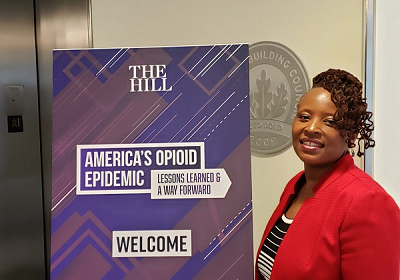ASAM Board Member Dr. Anika Alvanzo Participates in Panel Discussion on the Opioid Epidemic
 On February 26, ASAM Board Member Dr. Anika Alvanzo spoke on a panel at The Hill’s public forum “America’s Opioid Epidemic: Lessons Learned & A Way Forward.” Her comments focused on the importance of strengthening the addiction treatment workforce through various pieces of legislation currently under consideration by Congress.
On February 26, ASAM Board Member Dr. Anika Alvanzo spoke on a panel at The Hill’s public forum “America’s Opioid Epidemic: Lessons Learned & A Way Forward.” Her comments focused on the importance of strengthening the addiction treatment workforce through various pieces of legislation currently under consideration by Congress.
First, Dr. Alvanzo drew attention to the Medication Access and Training Expansion (MATE) Act, which is designed to ensure that all DEA controlled medication prescribers have a baseline knowledge of how to prevent, identify, treat, and manage patients with SUD. The bill would allow accredited medical schools and residency programs, physician assistant schools, and schools of advanced practice nursing to fulfill the training requirement created by the bill through comprehensive curriculum that meets the standards laid out in statute, without having to coordinate the development of such education with an outside medical society or state licensing body.
Dr. Alvanzo observed that once the MATE Act has been passed, Congress should then pass the Mainstreaming Addiction Treatment (MAT) Act. The MAT Act would eliminate the requirement that practitioners apply for a separate waiver through the DEA to prescribe buprenorphine for addiction and eliminate the patient limits on buprenorphine prescribers as well as the existing federal rules and regulations based on prescribing buprenorphine with the intent to treat addiction. By pairing the MATE and MAT Acts, Dr. Alvanzo noted that the buprenorphine waiver process would be removed, while all clinicians pursuing a DEA License would receive training on addiction treatment, thus significantly bolstering the addiction treatment workforce.
Finally, Dr. Alvanzo drew the panel’s attention to the Opioid Workforce Act, which would provide an additional 1,000 GME slots to qualifying hospitals with approved residency programs in addiction medicine, addiction psychiatry, pain medicine, and corresponding prerequisite programs. Dr. Alvanzo concluded by stating that the MATE and MAT Acts, if passed together, and the Opioid Workforce Act, would make significant progress towards alleviating the addiction treatment workforce shortage.
